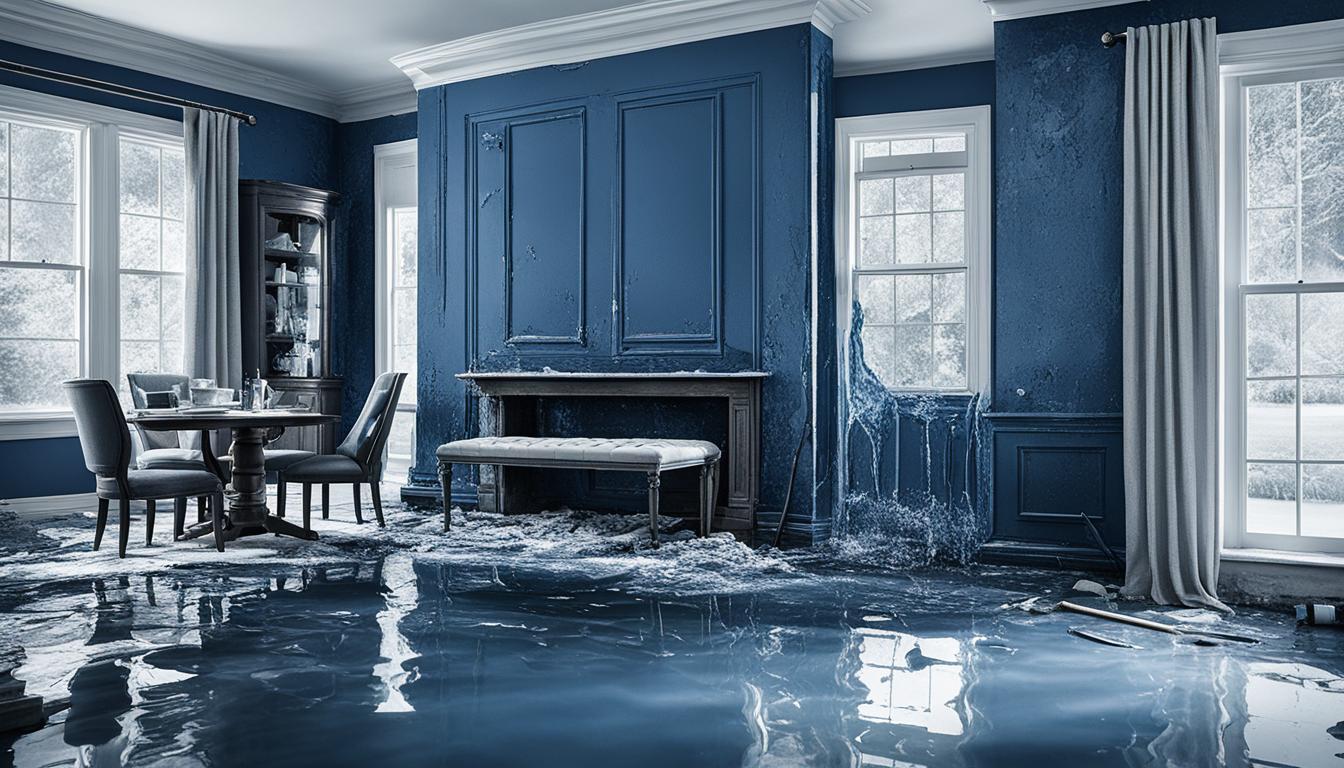Dealing with water damage in your property can be a stressful experience. However, it’s important to approach the restoration process with caution and avoid common mistakes that can exacerbate the situation. By taking the right steps and avoiding these pitfalls, you can ensure proper water damage restoration and protect your property from further harm.
In this section, we will explore the mistakes to avoid when dealing with water damage and provide you with actionable tips to mitigate the damage effectively. From delaying your response to neglecting safety precautions, we will cover it all so that you can make informed decisions and safeguard your property.
Key Takeaways:
- Delaying your response can worsen the water damage.
- Never ignore safety precautions to avoid injuries and health risks.
- Leave water damage restoration to professionals instead of attempting DIY methods.
- Document the damage thoroughly for insurance claims and reference.
- Address the source of water to prevent future incidents.
Delaying the Response
One of the biggest mistakes you can make is delaying your response to water damage. The longer the water sits, the more damage it can cause to your property. It is crucial to take immediate action and contact professionals for water damage restoration.
When water damage occurs, time is of the essence. Every moment that passes without proper intervention increases the risk of extensive damage. Water can seep into walls, floors, and furniture, causing structural issues, mold growth, and irreversible deterioration. The longer you wait, the more difficult and costly the restoration process becomes.
To avoid further complications, it is essential to enlist the assistance of experienced water damage restoration professionals. They have the expertise and equipment to assess the extent of the damage and implement the necessary mitigation strategies promptly. Their quick response will help salvage as much of your property as possible and minimize the potential for long-term consequences.
By delaying your response, you not only put your property at risk but also increase the likelihood of incurring higher expenses for repairs and replacements. Act swiftly to prevent additional damage and protect the value of your investment.
Importance of Immediate Response
Here is a list of potential risks and consequences associated with delaying water damage response:
- Structural damage to walls, floors, and ceilings
- Mold and mildew growth leading to health hazards
- Increased risk of electrical malfunctions and hazards
- Damage to personal belongings and valuables
- Compromised indoor air quality
- Depreciation of property value
Addressing water damage promptly not only safeguards your property but also promotes your well-being and peace of mind. Don’t underestimate the potential consequences of delaying the response to water damage.
| Consequences of Delaying Water Damage Response | Immediate Response |
|---|---|
| Extensive damage to building materials | Minimize damage to structural components |
| Higher risk of mold growth | Prevent mold and preserve indoor air quality |
| Potential electrical hazards | Ensure safety and reduce the risk of accidents |
| Increased damage to personal belongings | Salvage and restore valuable possessions |
| Longer restoration process | Minimize downtime and disruptions |
| Higher repair and replacement costs | Save money by addressing the issue promptly |
Ignoring Safety Precautions
When dealing with water damage, it is crucial not to overlook safety precautions. Water can pose various hazards, including electrical dangers, bacteria contamination, and structural weakening. To protect yourself and others, it’s essential to follow these safety guidelines:
- Turn off electricity: Before entering a flooded area, always switch off the electricity. Water and electrical currents can be a deadly combination, so take this precaution to prevent electrical shock.
- Wear protective gear: When working in water-damaged areas, ensure you wear appropriate protective gear, including gloves, boots, and respiratory masks if necessary. This will help minimize the risk of injuries and exposure to potentially harmful substances.
- Be cautious of structural integrity: Water damage can compromise the stability of buildings and structures. Avoid entering areas with visible signs of structural damage and be cautious of weakened floors, walls, or ceilings.
- Control the spread of contaminants: Water damage can introduce bacteria, mold, and other contaminants into your property. Take measures to minimize the spread of these substances by using disinfectants and sealing off affected areas.
By prioritizing safety precautions, you can mitigate risks and ensure a safer environment during the water damage restoration process.
Trying to Handle It Yourself
When faced with water damage in your property, it can be tempting to take matters into your own hands and attempt DIY water damage restoration. However, it’s important to consider the potential risks and limitations before embarking on this task.
DIY water damage restoration may seem cost-effective and convenient, but if not executed properly, it can lead to more harm than good. Improper techniques or incomplete drying can result in the growth of mold, which poses a serious health hazard. Additionally, inadequate restoration can lead to structural damage, further compromising the integrity of your property.
Instead of risking further damage and potential health risks, it’s advisable to hire experienced professionals for water damage restoration. These experts possess the necessary tools, knowledge, and expertise to effectively handle the restoration process. By entrusting the task to professionals, you can ensure a thorough and efficient restoration, giving you peace of mind.
Remember, DIY projects can be enjoyable and fulfilling, but when it comes to water damage restoration, it’s best to leave it to the professionals who are well-equipped to handle the intricacies of the process.
Neglecting to Document the Damage
When dealing with water damage, documenting the extent of the damage is crucial for insurance claims and future reference. By properly documenting the water damage, you can strengthen your case and ensure accurate compensation claims. Here are some essential steps to follow:
- Take photos and videos: Before you begin any restoration work, take detailed photos and videos of the affected areas. Capture the extent of the damage from different angles and close-ups. This visual evidence will serve as proof of the initial condition of your property.
- Focus on specific areas: Pay attention to specific areas where water damage is prominent, such as ceilings, walls, flooring, and furniture. Make sure to capture any visible signs of mold, discoloration, or structural deterioration.
- Include date and time: When documenting the damage, timestamp your photos and videos to establish a timeline. This will be useful during the claims process and for future reference.
- Describe the damage: Alongside the visual documentation, provide a written description of the damage. Include relevant details, such as the source of the water, the duration of exposure, and any immediate effects you have noticed.
- Save receipts and invoices: Keep a record of all expenses related to water damage restoration, including receipts for professional services, equipment rentals, and materials purchased. This documentation will support your compensation claims.
By diligently documenting the water damage, you can present a comprehensive case to your insurance company and ensure fair compensation for the restoration efforts. Remember, thorough documentation is key to a successful claims process.
Failing to Address the Source of Water
Water damage can wreak havoc on your property, causing costly repairs and health hazards. However, simply cleaning up the water without addressing the source is a common mistake many homeowners make. Whether it’s a leaky pipe, a malfunctioning appliance, or poor drainage, identifying and fixing the source of water is crucial to prevent future water damage incidents.
When water accumulates due to a leak or other issues, it can seep into walls, floors, and furniture, leading to mold growth, rot, and structural damage. By consulting a plumber or professional, you can get to the root of the problem and take the necessary steps to fix it.
Addressing the source of water damage not only prevents future incidents but also helps to ensure that any restoration work is effective and long-lasting. Simply drying out the affected areas without eliminating the source can lead to recurring problems and further damage down the line.
By identifying and fixing the cause of the water damage, you can protect your property from future incidents and save yourself from the headaches of dealing with repeat damage and costly repairs.
Remember, when it comes to water damage, taking immediate action to address the source is as important as the restoration process itself. Don’t overlook this crucial step in protecting your property and preserving its value.
Not Hiring Professional Water Damage Restorers
When it comes to dealing with water damage, hiring professional water damage restorers is an essential step that should not be overlooked. Attempting to handle the restoration process on your own or cutting corners with inexperienced individuals can lead to further damage and more costly repairs in the long run.
Professional water damage restorers have the expertise and equipment needed to handle the restoration process effectively. They are trained to assess the extent of the damage, develop a comprehensive plan, and execute the necessary steps to restore your property to its pre-damaged condition.
By relying on professionals, you can save yourself time, stress, and potential mistakes that could exacerbate the damage. Professionals understand the intricacies of water damage restoration, including the importance of thorough drying, mold prevention, and structural stability.
Moreover, professional water damage restorers are equipped with advanced tools and technologies specifically designed for the restoration process. This ensures that the job is done efficiently and effectively, minimizing the risk of future problems that may arise from incomplete restoration.
Dealing with water damage is not a task to be taken lightly. It requires the expertise of professionals who specialize in water damage restoration. By hiring professionals, you can have peace of mind knowing that your property is in capable hands, and the restoration process will be carried out with precision and professionalism.
| Benefits of Hiring Professional Water Damage Restorers |
|---|
| Expertise and knowledge in water damage restoration techniques |
| Use of specialized equipment for efficient and effective restoration |
| Thorough assessment of the damage to develop a comprehensive restoration plan |
| Expert handling of potential hazards, such as electrical risks and structural instability |
| Minimization of further damage and the risk of mold growth |
| Insurance claim support through detailed documentation of the damage |
Conclusion
In conclusion, when dealing with water damage, it’s essential to avoid common mistakes to ensure proper restoration and safeguard your property. Acting promptly is crucial, as delaying the response can lead to more extensive damage. Prioritize safety by turning off electricity and wearing protective gear before entering flooded areas.
Documenting the water damage is vital for insurance claims and reference. Take photos and videos of the affected areas to support accurate compensation claims. Additionally, addressing the source of the water is essential. Consult professionals to identify and fix the underlying issue to prevent future incidents.
Trusting professionals to handle the restoration process is key. Attempting DIY methods or cutting corners with inexperienced individuals can lead to further damage and costly repairs. Hire professional water damage restorers who have the expertise and equipment to handle the restoration effectively.
By following these steps – acting promptly, prioritizing safety, documenting the damage, addressing the water source, and trusting professionals – you can mitigate further harm and ensure the best outcome for your property. Don’t underestimate the importance of avoiding these mistakes to protect your property and achieve successful water damage restoration.
FAQ
What are the common mistakes to avoid when dealing with water damage restoration?
The common mistakes to avoid when dealing with water damage restoration include delaying the response, ignoring safety precautions, trying to handle it yourself, neglecting to document the damage, failing to address the source of water, and not hiring professional water damage restorers.
Why is delaying the response a mistake when it comes to water damage?
Delaying the response to water damage can lead to further damage to your property. The longer the water sits, the more it can seep into walls, floors, and furniture, causing structural damage and promoting mold growth. It is essential to take immediate action and contact professionals for water damage restoration.
What safety precautions should I take when dealing with water damage?
When dealing with water damage, it is important to prioritize safety. Always turn off electricity before entering a flooded area to avoid electrical hazards. Wear protective gear, such as gloves and boots, to prevent injuries or exposure to bacteria. If the water damage is extensive or involves contaminated water, it is best to consult a professional.
Can I handle water damage restoration on my own?
While it may be tempting to tackle water damage restoration on your own, it is recommended to hire professionals. DIY restoration can result in improper techniques, incomplete drying, and potential mold growth. Experienced professionals have the necessary tools and knowledge to effectively restore your property and minimize further damage.
Why is it important to document the water damage?
Documenting the water damage is crucial for insurance claims and future reference. Take photos and videos of the affected areas before starting any restoration work. This evidence will strengthen your case and support accurate compensation claims.
What should I do to address the source of water in case of water damage?
Addressing the source of water is vital to prevent future water damage incidents. Identify and fix the source, whether it is a leaky pipe or a malfunctioning appliance. Consulting a plumber or professional can help you determine the underlying issue and take appropriate measures to prevent further damage.
Why should I hire professional water damage restorers?
Hiring professional water damage restorers is crucial for effective restoration. They have the expertise and equipment to handle the restoration process properly, ensuring thorough drying, mold prevention, and structural repairs. Attempting DIY methods or relying on inexperienced individuals can result in further damage and more costly repairs in the long run.






